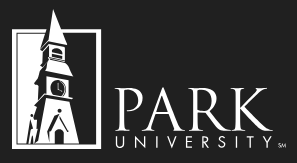by Bridget Locke, Director of Strategic Communications, January 2020
Although education was not his field of study as an undergraduate at Park University, alumnus Grant Williams, ’17, felt the pull toward teaching for many years.
Grant first began spending time in classrooms as a high school volunteer, earning the service hours required for various scholarships. Realizing he might have stumbled onto a career, Grant began student teaching in college while earning a Bachelor of Science in Business Administration from Park in 2017. After spending time substitute teaching, Grant became a teacher resident with the Kansas City Teacher Residency. The Residency program allowed him to co-teach with a mentor while earning his teaching certification and a master’s degree in education.
The work is fulfilling. It’s life-changing. And it’s “orders of magnitude” harder than one might imagine.
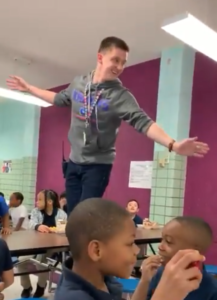
Meeting needs, motivating minds
The 2019-20 academic year marks Grant’s first year with a class of his own: a brilliant and spirited group of second graders at Phillis Wheatley Elementary School in Kansas City, Mo. While he has many years of training under his belt, Grant shared that effectively leading his own classroom–understanding their different personalities, needs and strengths—can be physically, mentally and emotionally demanding.
“Teaching is orders of magnitude harder than I could have ever possibly imagined. There are so many second-by-second decisions that take place.”
While managing a classroom takes skill and experience, inspiring students to learn often takes creativity and compassion.
“Wheatley students come from all walks of life, and some face tremendous hardships that many of us cannot even begin to fathom. Getting students motivated to learn and work, particularly those who struggle academically, is the hardest part of our job.”
Fortunately, Grant and his teaching colleagues are up for the challenge. In the last academic quarter of 2019, the first, second and third grade students at Wheatley Elementary studied non-fiction writing. To build their interest, Grant and his fellow teachers collaborated on initiatives to build excitement around the curriculum.
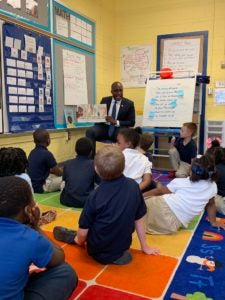
During the quarter, special guests came in to read to them–including Kansas City, Missouri Mayor Quinton Lucas, who responded to Grant’s personal outreach via Twitter. At the end of the quarter, the students concluded the learning unit by participating in a writing celebration, where they presented their work before an audience of fellow students, their parents and other invited guests.
The curriculum and the event taught them an important lesson about storytelling that can sometimes get lost at their age: communication is a two-way connection between the author or speaker and the audience. Grant often encourages his students to consider their audience when writing and believes that having an audience there, listening to them present their work, provided a very literal demonstration of the concept.
Beyond the teachable moments, the writing party provided an opportunity to celebrate their hard work.
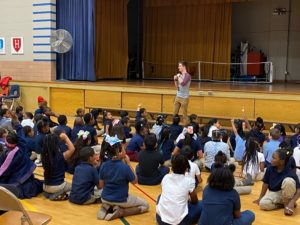
“To my knowledge, our school never had an assembly where student work was showcased to students and families,” said Grant. “We did not change the curriculum. We simply provided a fun way for them to exercise what they were already learning. The goal of the event was for students to see how cool it is to be a writer and how fun it is to celebrate hard work. So often hard work is put in without recognition. If a student gives his or her best effort, they deserve to be recognized for that. The writing party allowed that to happen.”
Try a little help from my friends
Among the special guests in the audience were visitors from his alma mater: Leah Fletcher, Director of Park University’s Career Development Center, and Meg Evans, Career Coach. The Career Development team saw Grant’s post about the writing celebration on LinkedIn and wanted to help him make the celebration special.
As a result, Grant became the catalyst for and first recipient of Career Development Center’s Professional Development Alumni Scholarship which, through a selection process, awards funds to employed Park U alumni who are pursuing professional development opportunities, have funding needs for enhanced work-related technology, or need to purchase supplies for a professional project.
The needed supplies, in Grant’s case? A tried-and-true motivator for first, second and third grade students from generation to generation: sugar.
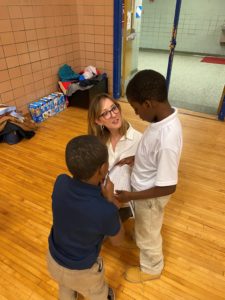
“Park’s Career Development team provided donuts and juice for the students at the celebration, which we otherwise would not have been able to provide; they’re very costly. But most importantly, Leah and Meg interacted with students, encouraged them during their presentations, and helped demonstrate to students that there are people outside the four walls of their classroom who really care about their success as learners,” Grant said.
Grant, who served as Park Student Government Association president as an undergrad, credits Park for preparing him for this career. “As a student, I was and am still learning from people who have been in the trenches that I am jumping into. Park has a ton of resources available for students. The value of this cannot be understated. The Career Development Center was a great asset during undergrad to help me explore opportunities—and they continue to support me as an alum.”
And he credits teaching for making him a well-rounded human being.
“Since becoming a teacher, I have learned a lot about myself as an educator and person. It is absolutely okay to be human. We often find ourselves in situations where we constantly have to be ‘on.’ The reality is, however, that we are human and make mistakes. It is important to be malleable in teaching. Just as students have to be molded and grow as students, educators have to grow and be molded into being highly effective teachers for our kids.”
Don’t “save.” Serve.
Being a teacher is very rewarding, Grant feels, and provides an avenue for making a difference in society. Still, he cautions current and future teachers against adopting a savior complex: “Education as a career should not be pursued if you want to ‘save’ students. Students do not need saving; they need high-quality teachers who want to help them learn and grow.”
And to that end, Grant acknowledges all the adults who helped him develop—which is why he is honored and eager to serve in that same capacity.
“I would not be where I am today if not for so many positive adult role models when I was younger. I encourage anyone: if you have a chance to be a positive influence in a child’s life, do not hesitate.”

